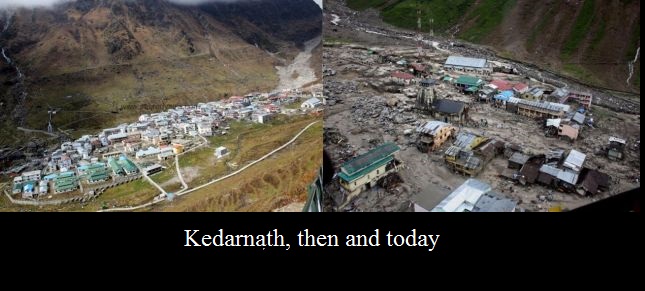Dehradun : One can but just twiddle one’s thumbs and feel sorry for Uttarakhand and its people for the governments that have ruled the state since came into existence in Nov 2000, and its leaders who swear to develop the state and uplift the masses when it comes to poll time, have done precious little to safeguard the life and property of its residents.
Despite knowing that the Uttarakhand Himalayas are fragile and the state falls in a seismic zone, there was no consideration for the sensitive activities of boring tunnels and excavating for constructing of hydro-electric projects, debris from which was dumped into the rivers, raising their beds and laying the foundation for the tragedy that has hit this small mountain state.
The state has a Uttarakhand Pollution Control Board, but it does not monitor where the debris from the hydro-electric projects being constructed is being dumped. “the union ministry of environment gives environment clearance for the projects and it is their officers who have to monitor where the debris is being dumped”, said a senior of the Board.
When asked how could the environment ministry officials come and monitor the dumping of debris into the river, he said point blank that it was their job and they get reports every six months about the muck management.
How could the staff from the centre do a daily monitoring of the debris being dumped into the rivers of the state from power projects, was neither his concern nor of the Board.
In fact when pointed out that the turbidity of the rivers flowing in Uttarkhand was enough evidence that debris being dumped into the rivers which had created this huge tragedy, as river beds had also risen, the senior official came to the rescue of the hydro power projects saying that the turbidity was not because of the debris from the projects, but due to landslides and landslips.
He, however, maintained that a real time monitoring station was coming up Haridwar, which would be operational in about two or three months, which would automqatically monitor the turbidity of the river water.
But what about its tributaries and other rivers on which projects were coming up in the higher reaches of the state, was not the state’s concern, it was of the centre which gave the nod.
Ironically the state governments have never decided to check the dumping of the debris into the rivers, despite knowing that there are over 200 hydro-electric projects under various stages of construction or in the pipeline.
There is no department to identify dumping sites for dumping the debris so that khuds and deep gorjes can be reclaimed.
This despite the fact that CAG in its report had warned that deforestation due to the projects was damaging the hills and there was no reforestation work worth the name being done by the project executors.
It had also been pointed that the project executors to save money on transportation of the debris, dump conveniently dump it into the rivers, as there is no one to check the practice.
It had also been brought to the notice of the state government that the high turbidity of the river waters due to the debris is finishing the aquatic flora and fauna, and at many places these had been virtually erased.
But for the bureaucracy of Uttarkhand and the politicians there are other more important things, than the life of the people, which the recent tragedy has exposed.
What else can explain that in a sensitive state like Uttarakhand where there are a number of rivers and a couple of hundred of power projects in the pipeline, neither did the politicians nor the bureaucracy think it fit to have the offices of pollution control board at all the district headquarters so that it staff can monitor what is happening at the ground level on a day-to-day basis.
There are just four regional offices of the Board in the state. The office at Dehradun looks after the far-flung districts of Rudraprayag, Chamoli, Tehri, Uttarkashi and Pauri, which ironically were the worst hit in the recent disaster.
The office at Haridwar looks after only that district, while the one at Kashipur looks after Udhamsinghnagar district the office at Haldwani looks after the hill districts of Kumaon division.
The officer at the Pollution Control Board, said that there task was only to monitor the air and water quality and that is about it.
The rivers are not within there purview, though he admitted that the previous BJP government had strengthened the Board by sanctioning 76 technical and non-technical posts.
However, he was hopeful that once the Ganga River basin Authority gets fully functional, the Board would get some more funds as the Ganga flows through a major portion of this small mountain state.
But the fact that the fragile ecology of Garhwal Himalayas in particular, needs constant monitoring, for him did not fall within the gambit of the Board’s working.
A journalist with over 40 years of experience, Jagdish Bhatt was Editor, Hill Post (Uttarakhand).
Jagdish had worked with India’s leading English dailies, which include Times of India, Indian Express, Pioneer and several other reputed publications. A highly acclaimed journalist, he was a recipient of many awards
Jagdish Bhatt, aged 72, breathed his last on 28th August 2021 at his Dehradun residence.



